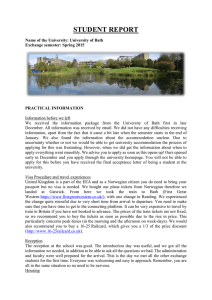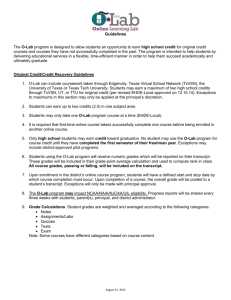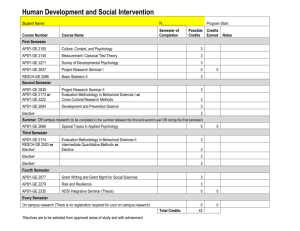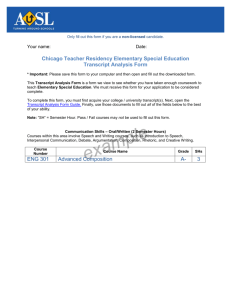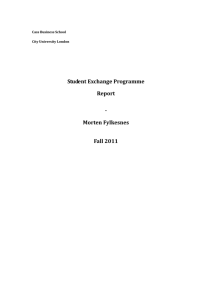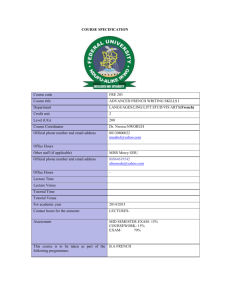University of Bath - Spring 2012
advertisement
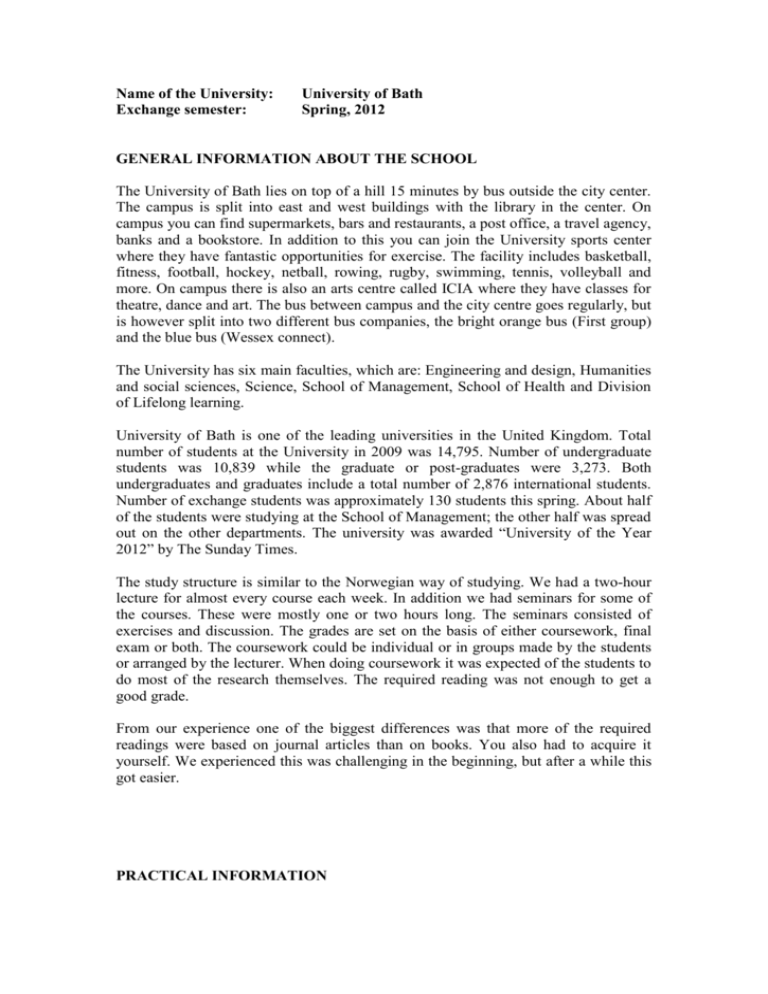
Name of the University: Exchange semester: University of Bath Spring, 2012 GENERAL INFORMATION ABOUT THE SCHOOL The University of Bath lies on top of a hill 15 minutes by bus outside the city center. The campus is split into east and west buildings with the library in the center. On campus you can find supermarkets, bars and restaurants, a post office, a travel agency, banks and a bookstore. In addition to this you can join the University sports center where they have fantastic opportunities for exercise. The facility includes basketball, fitness, football, hockey, netball, rowing, rugby, swimming, tennis, volleyball and more. On campus there is also an arts centre called ICIA where they have classes for theatre, dance and art. The bus between campus and the city centre goes regularly, but is however split into two different bus companies, the bright orange bus (First group) and the blue bus (Wessex connect). The University has six main faculties, which are: Engineering and design, Humanities and social sciences, Science, School of Management, School of Health and Division of Lifelong learning. University of Bath is one of the leading universities in the United Kingdom. Total number of students at the University in 2009 was 14,795. Number of undergraduate students was 10,839 while the graduate or post-graduates were 3,273. Both undergraduates and graduates include a total number of 2,876 international students. Number of exchange students was approximately 130 students this spring. About half of the students were studying at the School of Management; the other half was spread out on the other departments. The university was awarded “University of the Year 2012” by The Sunday Times. The study structure is similar to the Norwegian way of studying. We had a two-hour lecture for almost every course each week. In addition we had seminars for some of the courses. These were mostly one or two hours long. The seminars consisted of exercises and discussion. The grades are set on the basis of either coursework, final exam or both. The coursework could be individual or in groups made by the students or arranged by the lecturer. When doing coursework it was expected of the students to do most of the research themselves. The required reading was not enough to get a good grade. From our experience one of the biggest differences was that more of the required readings were based on journal articles than on books. You also had to acquire it yourself. We experienced this was challenging in the beginning, but after a while this got easier. PRACTICAL INFORMATION Information before we left We received the information package from the University of Bath first in late December. We got a lot of information by e-mail and very little information by airmail. We did not have any difficulties receiving information, apart from the fact that it came a bit late when the semester starts in the beginning of February. Visa Procedure and travel experiences United Kingdom is a part of the EEA (European Economic Area) so we faced no problems according to visa and traveling. No visa is needed and no other permission either. The plane ticket can be bought from Ryanair, Norwegian or SAS to London. Nevertheless, we recommend traveling with a company landing on Heathrow because of the express train to Paddington. It is also possible to travel to Bristol with KLM, but there are no direct planes from Norway to Bristol. From London we used the national railway (nationalrail.co.uk). It can be very expensive to travel by train in Britain if you have not booked in advance. This particularly concerns peak-times (in the morning and the afternoon on week-days). You can also travel by bus from London (nationalexpress.co.uk). Academic Calendar We arrived at February 1th since we could move into our room from that day on, but the first day of introduction was February 3th. There were some social events in the first week, but the first day of semester was the following Monday, on February 6th. We had one break during the semester; it was the Easter break which lasted for two whole weeks. The last day of classes was on May 3th. We had a revision week from May 6th until the examination period started from May 17th depending on which courses we had. The examination period lasted until June 1th which was officially the last day of the semester. Reception The reception at the school was very good. The introduction day was very useful and we got all the information we needed, in addition to be able to ask all the questions we had. The administration and faculty were well prepared for the arrival. At arrival we got a buddy, and there was gathered a group of existing students which arranged parties and happenings throughout the semester. Housing We were offered housing from the University Accommodation. We all got a room in city (off-campus) accommodation. We were not able to apply for housing until the beginning of December and did not receive full confirmation until January. If you did not want to live in University Accommodation you could receive help from the University to find private accommodation as well. Costs Overall it is a bit cheaper in the UK than in Norway, especially for food etc. Rent is expensive, if living in University Accommodation rent is between £75 and £115 per week. Books costs from £30-50 new, it is possible to buy cheaper or used books on Amazon etc. The International Office The International Office is available for exchange students and they were very helpful. You could always stop by the office if you had any problems or questions. We received all necessary information from the office. Silvana Stanford was the Academic Exchange Officer and was responsible for incoming exchange students. Exchange promotion The exchange fair was the same day as our exam in Operation Management, so we could not promote our home university. Social Activities The relationship among the exchange students was very good. However, it was difficult to get in touch and get to know the English students even though we had lectures with them. There is a student union at campus and the exchange students were as much a part of it as all other students at the school. The school arranged trips around the UK for all students, but it was mostly international students who participated. Some of these trips were to Windsor Castle, Stonehenge and Lake District. We all really liked it at the school. Culture and Language There were no language problems between us and the faculty and other students. The possibilities to experience the country and the English culture are many. You can travel around the UK by bus or train. Cultural and Social Effects from the Exchange Experience The exchange experience is a good way of learning about different cultures and meeting people from all over the world. By going on exchange you show that you are willing to take a challenge and that you are not afraid of expanding your point of view. It will also influence future career possibilities in a good way. ACADEMIC INFORMATION The Teaching situation The courses are taught in English and most of the lecturers were easy to understand. The level of study was very similar to the level we are used to at BI. The teaching method in some of the courses was more practical than what we are used. It depends on which courses you choose. Most lecturers used lectures with powerpoint slides and some had cases and examples the students were required to be prepared to discuss in class. The workload was similar to that at BI. The relationship between faculty and students was good. The lecturers were always open for questions before, during and after the lecture. We had no problems approaching them with questions. The relationship between students in the classroom was very similar to BI. Some of the classes were smaller, but students tend to sit with their friends. Required Literature All the required literature is in English. The level of the literature was about the same as at BI. The courses we chose had most of the readings in articles, journals, cases and other, instead of reading a specific book. Some courses required reading a book, it is for a broad overview and additional reading is necessary. The exam was mostly based on lecture notes and slides, but to get a high grade it was necessary to understand the textbooks and the additional reading. Exams In most of the courses we had two hour written exams. The theoretical units had essay questions and the mathematical units had a mix of essay questions and numerical questions. To pass the exam you had to be able to answer correctly 40 % of the exam and have a good understanding of the subject. It is about the same as required at BI. Also, we had to hand in assignments through the semester, which counted 20-70% of our grade, depending on the course. Other Access to the library was very easy and all books and resources were open for students to borrow. The library was open 24 hours a day and there were a lot of computers for students to use. You only needed your student-id and your password to access these. Printers and copiers were also available, but you had to pay for the prints (same sort of system we have at BI). As BI uses at.bi.no, University of Bath uses Moodle and SAMIS to access the same information. Description of Courses MN20015 Market Analysis Prerequisites: None Exam: 30% coursework, 70% written exam Comments: This course is similar to the Statistics course at BI. You learn how to use SPSS, how to collect data and how to execute different tests. It is very straight forward, and the teacher explains it very well. MN20017 Operations Management Replacing course at BI: Logistics (MAD 2114) Prerequisites: None Exam: 30% group assignment, 70% individual assignment Comments: This class was fun. All the teachers are very lively and energetic and often show movies and pictures to make their point. MN20310 Empirical research methods in finance Prerequisites: Finance 1 Exam: 100% written exam Comments: This course is a mixture of finance and statistics. You learn how to use eViews. The lectures were not so helpful, but we managed to read and learn it by ourselves. MN20445 Corporate Responsibility: Principles and perspectives Prerequisites: None Exam: 40% coursework, 60% written exam Comments: This course focuses on why a company has responsibilities, both social and related to business. It gives a great insight on why and how companies operate. The classes were very straightforward, but we also had some group discussions. We learned a lot by doing coursework, which existed of two written 1500 words essays. MN30409 Business Strategy in a Global Economy Exam: Written exam 70%, coursework 30% Prerequisites: Comments: This course focuses on different strategies to enter or expands markets. The class builds on case studies presented by students as coursework. The class was divided into ten groups consisting of approximately six students. Be aware that this course, as other MN30xxx, is taken by final year students in Bath. EL10070 Cambridge Certificate of Advanced examination class Replacing course at BI: Intercultural Communication in English (SPÅ 2402) Prerequisites: none Exam: No final exam, we had 3 tests/assessments during the semester. Comments: Enjoyable classes with excellent teachers, good way of learning the English language better. We practice both writing and speaking in addition to grammar and vocabulary exercises.
